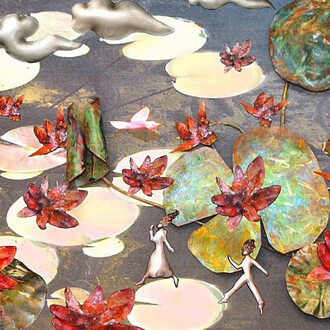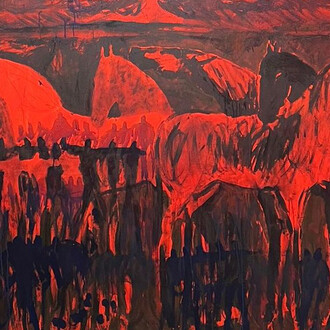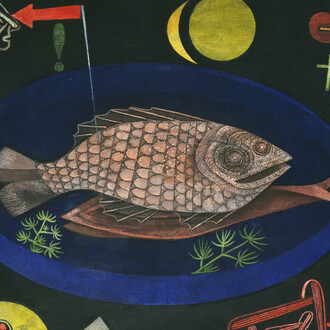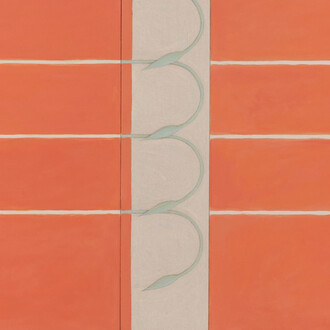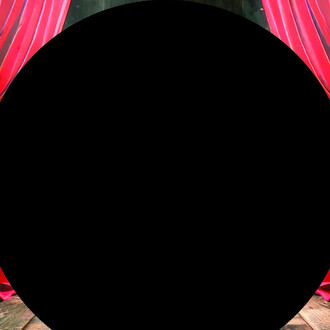Fredericks and Freiser is pleased to announce an exhibition of new paintings by Maria Calandra. Calandra’s painting overpowers modern apathy and digitized disconnection through saturated and hypnotic form.
As humanity becomes increasingly distanced from the organic world and sequestered in cities or behind screens, Calandra’s landscapes defy this status quo. And while existential concerns like the climate crisis and a modern “loneliness epidemic” loom large, Calandra returns to the roots of the landscape genre to restore faith in a sublime connection between the individual and the environment. Vivid, experiential, and embodied, Calandra’s liquid inversions not only reconnect the viewer to the landscape but also reconnect the landscape to itself. There is rarely a horizon line to be found in her work, which instead allows sky, sea, and foliage to melt into one another on the canvas, creating an effect of tumultuous unity.
Calandra’s work stands out among a rising cadre of contemporary landscape painters through her dedication to a transportive perceptual immediacy. Unlike other artists who repeat, in paint, the anaesthetized screen spaces of contemporary digital distortion and artificial reality, Calandra’s works recommit to landscape painting as a method of activating a sense of transcendence in the viewer. Calandra’s work is also particularly refreshing in its balance between realism and painterly abstraction.
Through vibrant color and hypnotic details, each work is suggestive of a unique atmosphere that the artist has experienced in person—whether that be the mountains in the south of France, the swamps of Florida, the Grand Canyon, or the California coast. Each scene then takes on a life of its own in the studio, where line and color spill together in delicate harmony. These challenging works demand sustained visual engagement. Exhilarating and uninhibited, Calandra’s work injects the contemporary landscape scene with much- needed energy.
Distinctly revitalizing for landscape as a genre in the twenty-first century, Calandra’s expansive work calls upon myriad art historical traditions of classical and avant-garde painting that further set her apart from other landscapists with narrower foundations. Her lines move with a sinuous grace that appeal to the figural contortions found in El Greco paintings, but Calandra’s swooping arabesques are thickly saturated with wild color and move freely across the canvas in a manner entirely her own. Drawing from an opulent landscape tradition of careful attention to detail and imaginative freedom, Calandra’s repetitive linework nods to Van Gogh while her deliberately dreamlike vistas are reminiscent of Joan Miró’s Surrealist landscapes. Inviting these comparisons and many more, Calandra’s paintings fit into a lineage of landscape as an expansive and
sometimes paradoxical space where immediacy and memory intertwine. The canvas itself becomes animated, breathing color and movement into its surroundings. Sometimes psychedelic in their coloring, works such as Descending on Fiery Beams provoke a meditative and spellbound experience. Uniting a profound respect for the power of the natural world with a desire for reconnection to our environment, Calandra’s paintings ask the viewer to make a journey inward as well as outward.
The fiery violence of sunset colors in Red Light Over Weir Island balances a sense of the eternal with a keen awareness of the precarity of our relationship to the natural environment. The unknowable expanse of the ocean or the mysteries hidden in dense vegetation present sublime juxtapositions of light and darkness. With no defined boundaries, these works liberate themselves and the viewer from rigidity and mediation, offering a radiant sense of potential energy.









